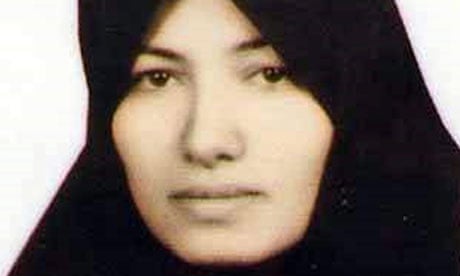Brazilian president Luiz Inácio Lula da Silva has stepped into the international outcry over Sakineh Mohammadi Ashtiani, the Iranian woman sentenced to death by stoning for adultery, by offering his country as a refuge, a move which raised hopes her life will be spared.
The surprise offer prompted an immediate reaction from Iran, which considers Brazil a key ally. Iranian officials softened their tone with Ashtiani's family over the weekend and official media reported full details of the story for the first time.
"I don't think Iran can ignore Brazil as easily as it ignored other countries," Ashtiani's son, Sajad, told the Guardian today. "It is very important that Brazil, as one of Iran's most significant allies in the world, has offered a haven for my mother."
He hoped Turkey, which also carries influence with Tehran, would add its voice. "No countries in the world can have such impacts that Brazil and Turkey can have on Iran now. These two countries can save my mother's life," said Sajad.
Ashtiani, a 43-year-old mother of two, was convicted in 2006 of having an "illicit relationship" with two men and received 99 lashes. A court later amended the conviction to "adultery while being married" and sentenced her to death by stoning.
Iran rebuffed clemency appeals by human rights campaigners and the west but signalled willingness to listen to a South American ally who has forged a close bond with President Mahmoud Ahmadinejad and defended Iran's right to a peaceful nuclear programme.
Lula offered Ashtiani asylum at a political rally yesterday in Curitiba, southern Brazil. "If my friendship with the president of Iran and the regard I hold him in is worth something, if this woman is causing discomfort, then we will willingly receive her here."
He added: "I find myself imagining what would happen if one day there was a country in the world that would stone a man because he was cheating. Nothing justifies the state taking someone's life. Only God gives life and only He should take it away."
Tehran, short of international friends, seemed keen to appease a Brazilian ally who has been criticised at home and abroad for championing Iran's case at the UN.
Shortly after Lula's speech Iranian officials rang Sajad and said his mother's case would be dealt with this week. "Their tone was more polite than before. After President Lula's comment, for the first time agencies in Iran reported my mother's stoning case, it shows how important Brazil is for Iran."
A source close to the family said Ashtiani's lawyer, Houtan Kian, had been summoned to a meeting in Tehran's high court on Wednesday and that the case could be resolved the same day.
Lula's intervention ended weeks of Iranian media blackout over Ashtiani. The semi-official Fars News Agency – mouthpiece of the regime – reported Lula's offer and for the first time said Ashtiani was sentenced to death by stoning for adultery. Usually it censors the word stoning.
Jahan News, a website close to Iran's Revolutionary Guards, struck a critical tone. "The Brazilian president is under the influence of western propaganda … and has interfered in Iran's internal affairs." It said Ashtiani was convicted of adultery and murder, even though a court rejected the latter charge.
Lula's offer was a rare foray into international human rights. The Guardian understands the move came after a presidential aide brought an internet campaign against the execution to the president's attention.
In a recent conversation Brazil's foreign minister, Celso Amorim, is understood to have urged his Iranian counterpart, Manouchehr Mottaki, to grant Ashtiani a pardon.
Specific details of the asylum proposal – such as where Ashtiani might live in Brazil – have not yet been examined, said a source familiar with the talks. "None of this has been thought about yet. If she was exiled she would be able to go wherever she wanted. No solution would involve separation from her children."
Keen to boost Brazil's role on the global stage, Lula has made recent trips to the Middle East and rebuked US-led sanctions against Iran.
Western diplomats in Brasilia said the asylum offer may be linked to speculation that Lula wants to become the UN's next secretary general after he leaves office at the end of the year. "How can you become secretary general if you haven't shown some inclination on human rights?"
Human rights activists said the offer could save the condemned prisoner. "I'm sure Iran was not expecting Brazil to join Sakineh's campaign and this unprecedented move … will change the way Iran sees Sakineh's case," said Mina Ahadi of the Iran Committee against Stoning (ICAS).
She urged Brazil to use its influence to lobby for the release of at least 12 other women awaiting execution by stoning.




